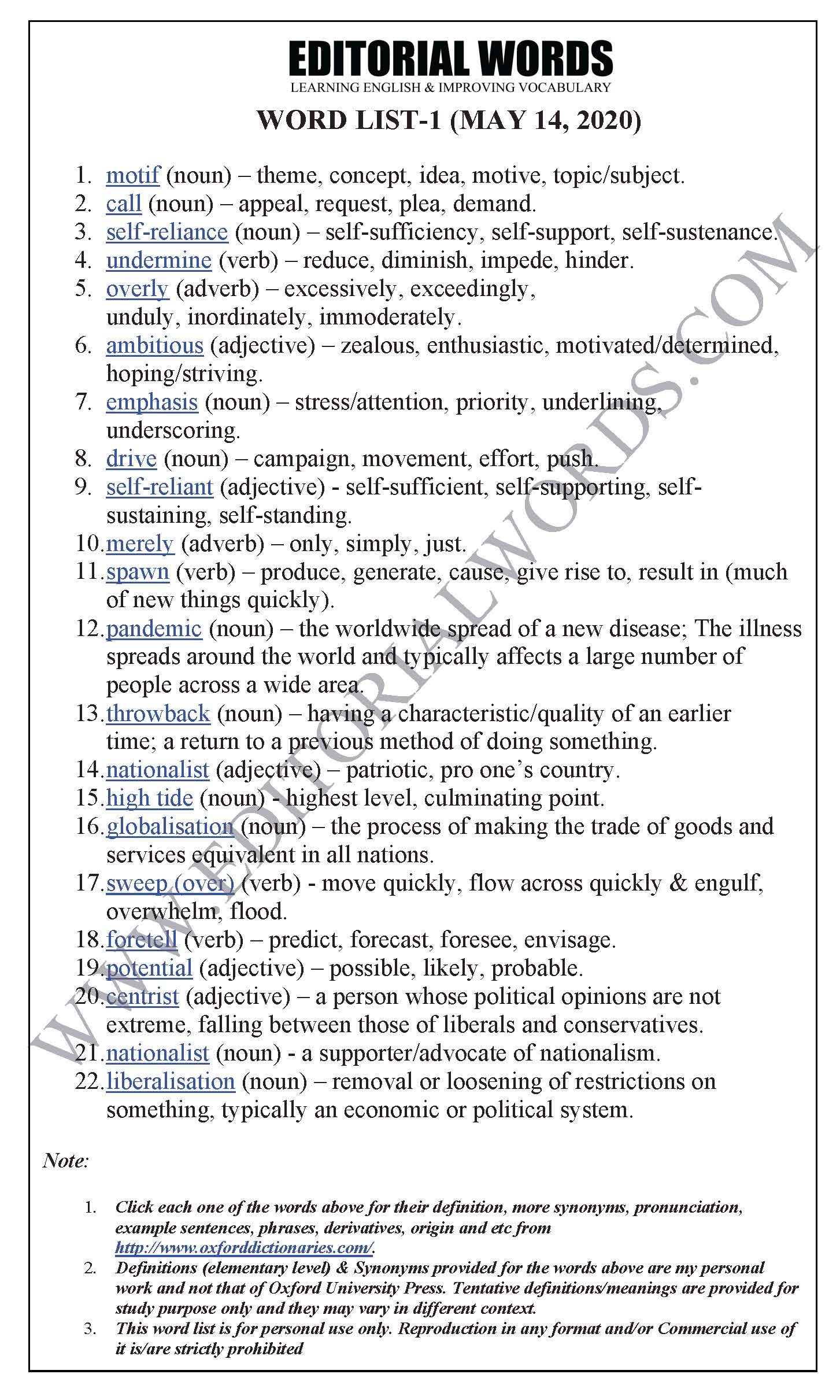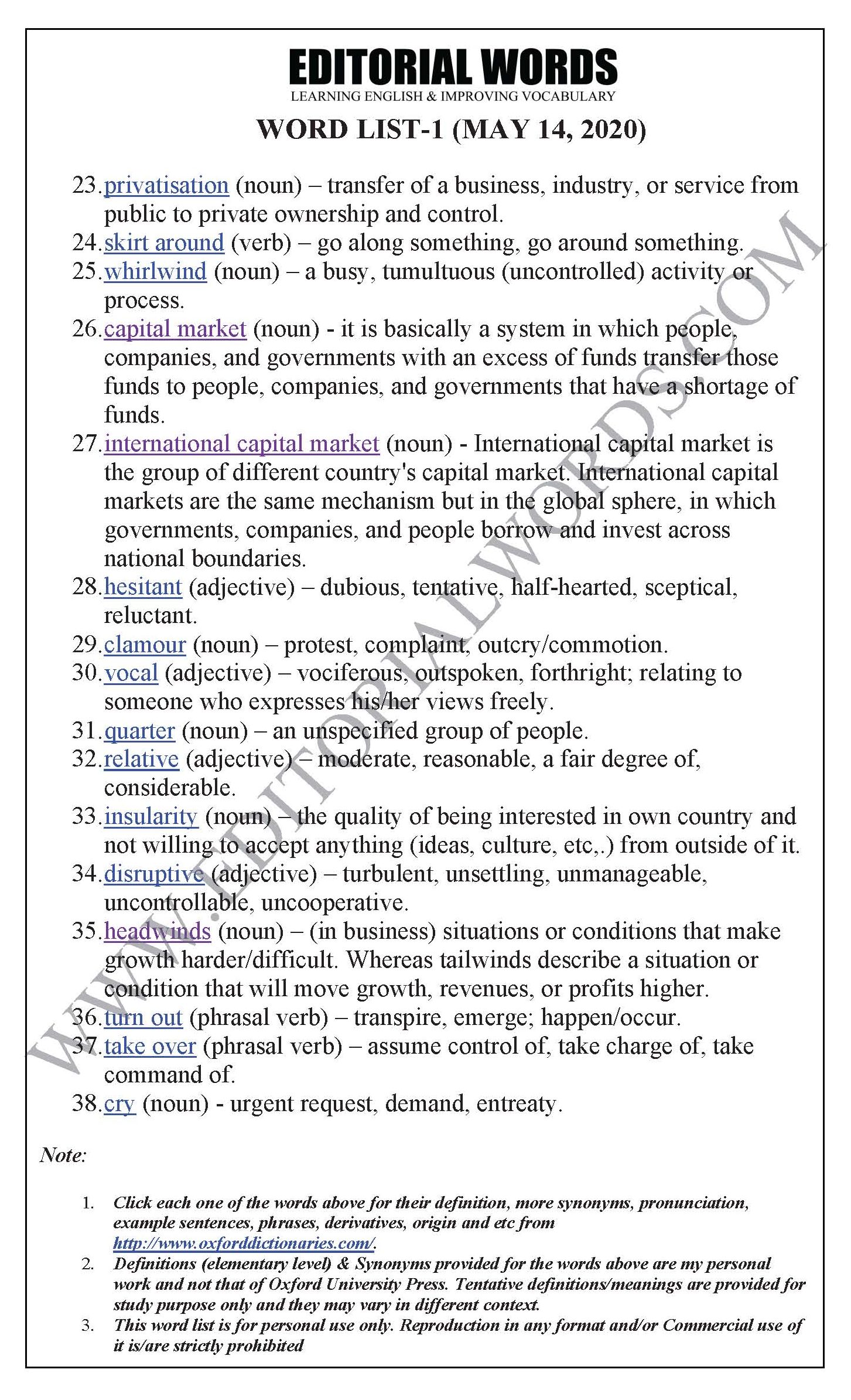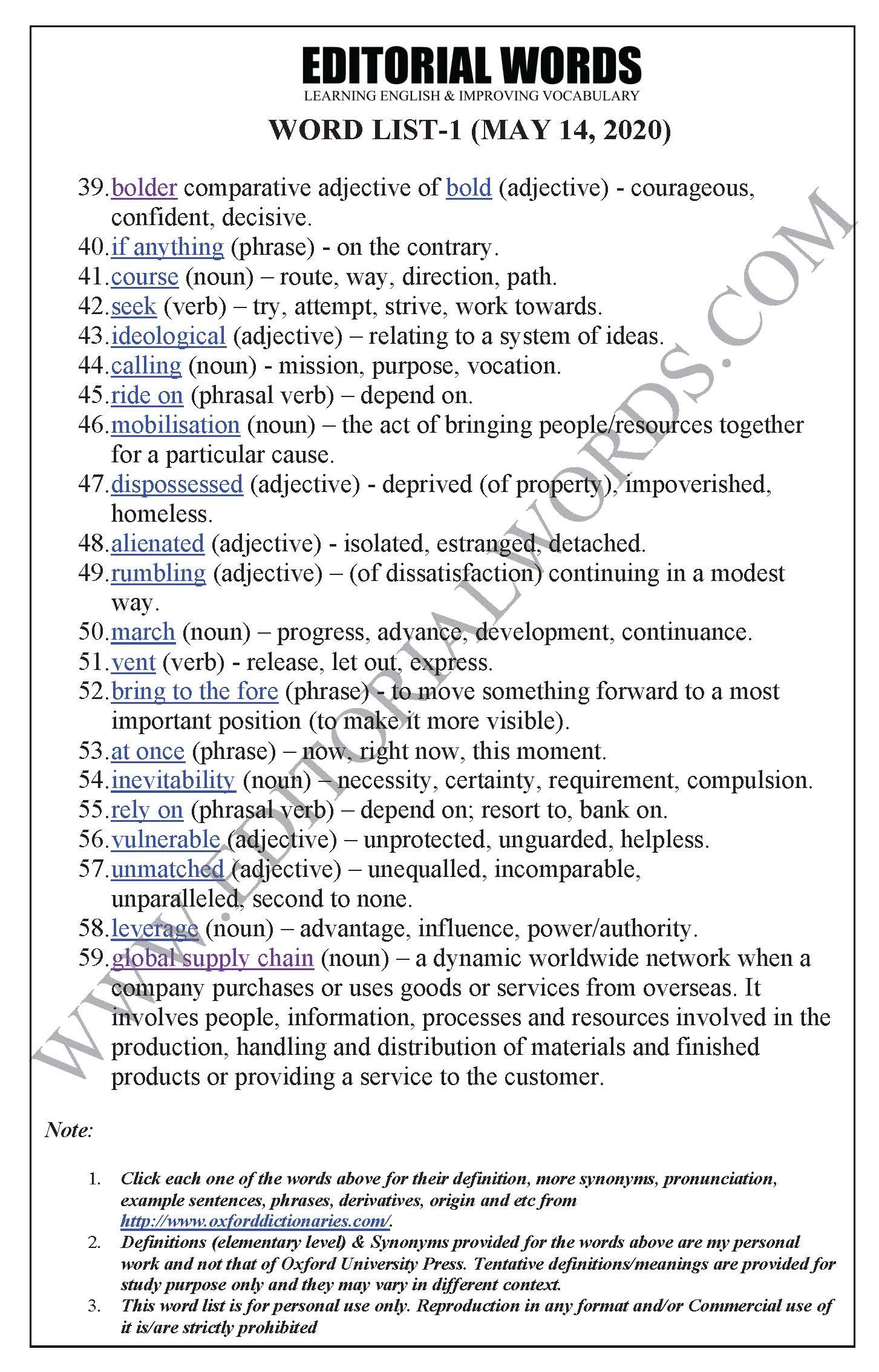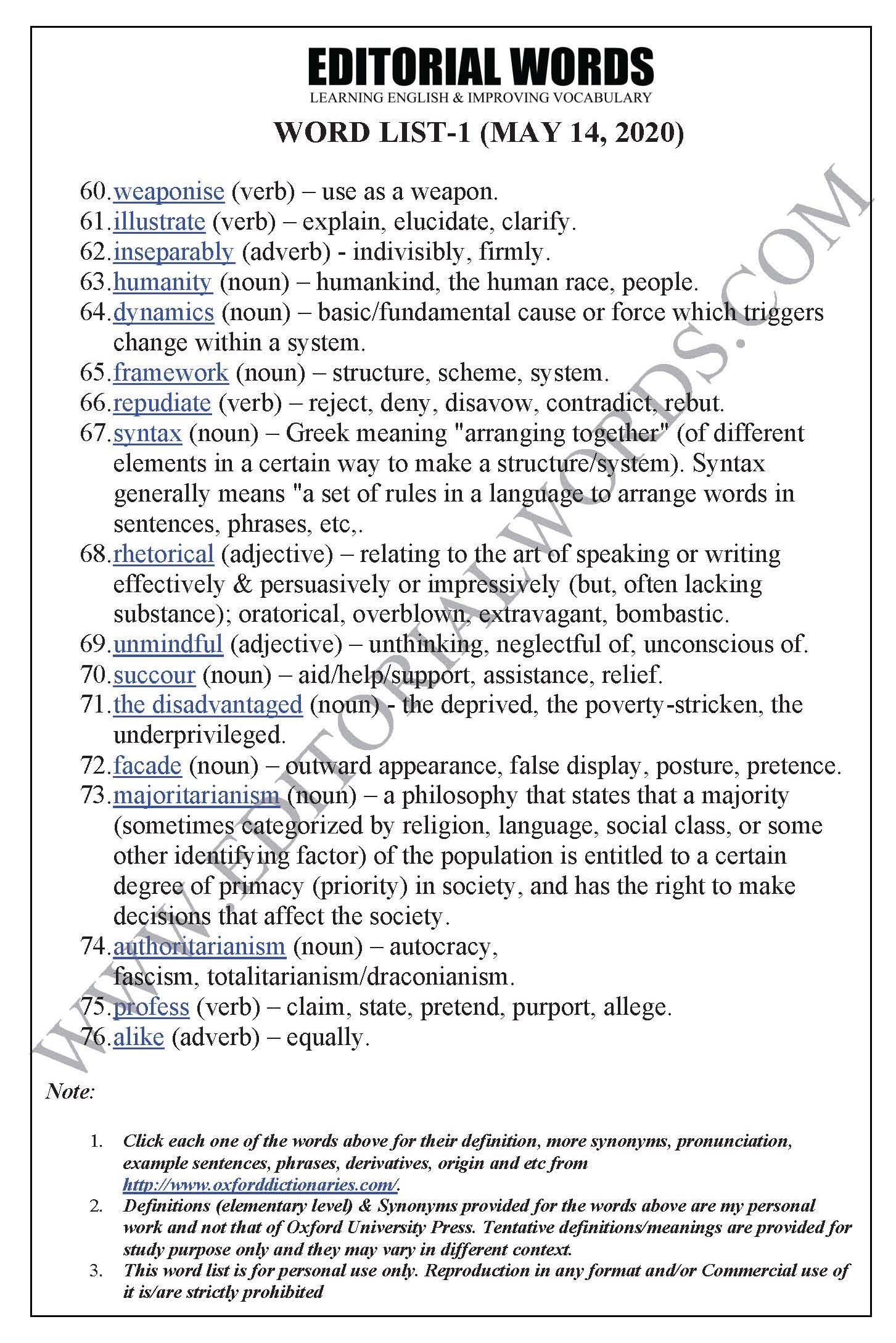The Hindu Editorial (Local motif) – May 14, 2020
Prime Minister Narendra Modi’s emphasis on Tuesday, on a renewed drive for a self-reliant India… For further reading, visit “The Hindu”. Below is today’s word list-1 for The Hindu Editorial (Local motif) – May 14, 2020.
To read this article, click here.
This preview is provided here with permission.
Courtesy: The Hindu
Today’s word list-1 for The Hindu Editorial (Local motif) – May 14, 2020
- motif (noun) – theme, concept, idea, motive, topic/subject.
- call (noun) – appeal, request, plea, demand.
- self-reliance (noun) – self-sufficiency, self-support, self-sustenance.
- undermine (verb) – reduce, diminish, impede, hinder.
- overly (adverb) – excessively, exceedingly, unduly, inordinately, immoderately.
- ambitious (adjective) – zealous, enthusiastic, motivated/determined, hoping/striving.
- emphasis (noun) – stress/attention, priority, underlining, underscoring.
- drive (noun) – campaign, movement, effort, push.
- self-reliant (adjective) – self-sufficient, self-supporting, self-sustaining, self-standing.
- merely (adverb) – only, simply, just.
- spawn (verb) – produce, generate, cause, give rise to, result in (much of new things quickly).
- pandemic (noun) – the worldwide spread of a new disease; The illness spreads around the world and typically affects a large number of people across a wide area.
- throwback (noun) – having a characteristic/quality of an earlier time; a return to a previous method of doing something.
- nationalist (adjective) – patriotic, pro one’s country.
- high tide (noun) – highest level, culminating point.
- globalisation (noun) – the process of making the trade of goods and services equivalent in all nations (Courtesy: VOA Learning English).
- sweep (over) (verb) – move quickly, flow across quickly & engulf, overwhelm, flood.
- foretell (verb) – predict, forecast, foresee, envisage.
- potential (adjective) – possible, likely, probable.
- centrist (adjective) – a person whose political opinions are not extreme, falling between those of liberals and conservatives.
- nationalist (noun) – a supporter/advocate of nationalism.
- liberalisation (noun) – removal or loosening of restrictions on something, typically an economic or political system.
- privatisation (noun) – transfer of a business, industry, or service from public to private ownership and control.
- skirt around (verb) – go along something, go around something.
- whirlwind (noun) – a busy, tumultuous (uncontrolled) activity or process.
- capital market (noun) – it is basically a system in which people, companies, and governments with an excess of funds transfer those funds to people, companies, and governments that have a shortage of funds.
- international capital market (noun) – International capital market is the group of different country’s capital market. International capital markets are the same mechanism but in the global sphere, in which governments, companies, and people borrow and invest across national boundaries.
- hesitant (adjective) – dubious, tentative, half-hearted, sceptical, reluctant.
- clamour (noun) – protest, complaint, outcry/commotion.
- vocal (adjective) – vociferous, outspoken, forthright; relating to someone who expresses his/her views freely.
- quarter (noun) – an unspecified group of people.
- relative (adjective) – moderate, reasonable, a fair degree of, considerable.
- insularity (noun) – the quality of being interested in own country and not willing to accept anything (ideas, culture, etc,.) from outside of it.
- disruptive (adjective) – turbulent, unsettling, unmanageable, uncontrollable, uncooperative.
- headwinds (noun) – (in business) situations or conditions that make growth harder/difficult. Whereas tailwinds describe a situation or condition that will move growth, revenues, or profits higher.
- turn out (phrasal verb) – transpire, emerge; happen/occur.
- take over (phrasal verb) – assume control of, take charge of, take command of.
- cry (noun) – urgent request, demand, entreaty.
- bolder comparative adjective of bold (adjective) – courageous, confident, decisive.
- if anything (phrase) – on the contrary.
- course (noun) – route, way, direction, path.
- seek (verb) – try, attempt, strive, work towards.
- ideological (adjective) – relating to a system of ideas.
- calling (noun) – mission, purpose, vocation.
- ride on (phrasal verb) – depend on.
- mobilisation (noun) – the act of bringing people/resources together for a particular cause.
- dispossessed (adjective) – deprived (of property), impoverished, homeless.
- alienated (adjective) – isolated, estranged, detached.
- rumbling (adjective) – (of dissatisfaction) continuing in a modest way.
- march (noun) – progress, advance, development, continuance.
- vent (verb) – release, let out, express.
- bring to the fore (phrase) – to move something forward to a most important position (to make it more visible).
- at once (phrase) – now, right now, this moment.
- inevitability (noun) – necessity, certainty, requirement, compulsion.
- rely on (phrasal verb) – depend on; resort to, bank on.
- vulnerable (adjective) – unprotected, unguarded, helpless.
- unmatched (adjective) – unequalled, incomparable, unparalleled, second to none.
- leverage (noun) – advantage, influence, power/authority.
- global supply chain (noun) – a dynamic worldwide network when a company purchases or uses goods or services from overseas. It involves people, information, processes and resources involved in the production, handling and distribution of materials and finished products or providing a service to the customer.
- weaponise (verb) – use as a weapon.
- illustrate (verb) – explain, elucidate, clarify.
- inseparably (adverb) – indivisibly, firmly.
- humanity (noun) – humankind, the human race, people.
- dynamics (noun) – basic/fundamental cause or force which triggers change within a system.
- framework (noun) – structure, scheme, system.
- repudiate (verb) – reject, deny, disavow, contradict, rebut.
- syntax (noun) – Greek meaning “arranging together” (of different elements in a certain way to make a structure/system). Syntax generally means “a set of rules in a language to arrange words in sentences, phrases, etc,.
- rhetorical (adjective) – relating to the art of speaking or writing effectively & persuasively or impressively (but, often lacking substance); oratorical, overblown, extravagant, bombastic.
- unmindful (adjective) – unthinking, neglectful of, unconscious of.
- succour (noun) – aid/help/support, assistance, relief.
- the disadvantaged (noun) – the deprived, the poverty-stricken, the underprivileged.
- facade (noun) – outward appearance, false display, posture, pretence.
- majoritarianism (noun) – a philosophy that states that a majority (sometimes categorized by religion, language, social class, or some other identifying factor) of the population is entitled to a certain degree of primacy (priority) in society, and has the right to make decisions that affect the society.
- authoritarianism (noun) – autocracy, fascism, totalitarianism/draconianism.
- profess (verb) – claim, state, pretend, purport, allege.
- alike (adverb) – equally.
Note:
1. Click each one of the words above for their definition, more synonyms, pronunciation, example sentences, phrases, derivatives, origin and etc from http://www.oxforddictionaries.com/.
2. Definitions (elementary level) & Synonyms provided for the words above are my personal work and not that of Oxford University Press. Tentative definitions/meanings are provided for study purpose only and they may vary in different context.
3. This word list is for personal use only. Reproduction in any format and/or Commercial use of it is/are strictly prohibited.
Today’s word list-1 The Hindu Editorial (Local motif) – May 14, 2020:




“Phrasal Verbs” We Learnt Last Week
“Idioms & Phrases” We Learnt Last Week
“Important Definitions” We Learnt Last Week
Recent Word Lists For The Hindu Editorial Articles

Be the first to comment